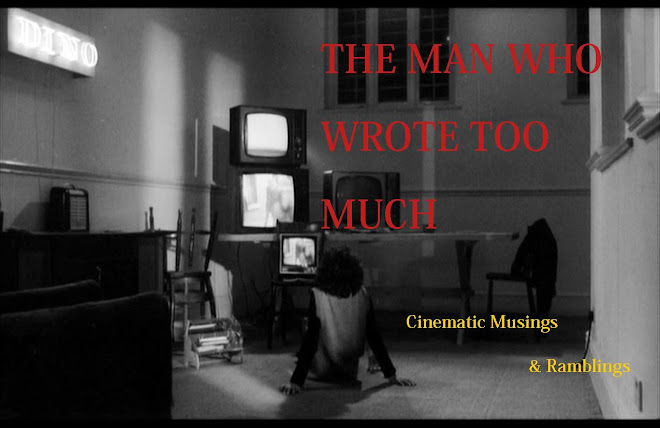Where do we
start? Well The Wild One (1953) I
guess is the obvious year zero choice. Brando and his boys roll into small town
Americana, shake up the squares, “What are you rebelling against?” “Whad’ya
got?” etc. All good, but not quite there, Lee Marvin is pretty brutal, but
they’re all riding Triumphs! Forget it. The rest of the 1950’s is all
generalised teenage delinquency and Hot Rodders on chicken runs.
Suddenly
though, the 60’s brings the real biker gangs! Grease stained romanticism, men
of the road, free from the constraints of society man! Fightin’ and fuckin’ and
chain whippin’ themselves into straight society’s consciousness. Who are these
devils? Dr Thompson is certainly intrigued, enough so to write them into urban
legend with Hells Angels: The Strange
and Terrible Saga of the Motorcycle Outlaw Gangs (1966). Ok now our interest
is piqued, and that goddamn’ Kenneth Anger’s Scorpio Rising (1964) sure ain’t doing no one no favours. It’s ok,
it’s 1966, Roger Corman knows a scene ripe for exploitation when he sees one, The Wild Angels (1966) is released,
records are broken, ladies and gentlemen we have a new movement to exploit,
let’s get loaded and have a good time.
Over the
next five or so years, a plethora of piteous ‘bikesploitation’ flicks were
released, most of them it seems by sub z-grade schlock meister Al Adamson. The
fact that Hells Angels on Wheels is
one of the ‘gems’ of the genre says a lot.
The unique
selling point of this picture at the time was its accreditation as the only
biker picture ‘officially endorsed’ by the Hell’s Angels themselves. This
approval is confirmed with a brief cameo from Sonny Barger, the leader of the
Oakland chapter planting a smooch on an uncomfortable looking Adam Roarke
during the opening credits. Its place in bikesploitation history now is
maintained by the fact that the main star of the picture is a pre superstardom
Jack Nicholson.
Nicholson played
a bad boy biker in the same years risible The
Rebel Rousers, a film so poor it didn’t actually get a release until three
years later on the back of his fame in the most iconic bike pic of them all Easy Rider (1969). But here Uncle Jack
plays ‘Poet’ a petrol station attendant drawn into the world of biker gangs
after proving himself worthy in a ruck at a local bar. Unfortunately Poet takes
an increasing liking to the leader Buddy’s (the aforementioned Roarke) gal, a
few more rucks, rides, a wedding and a PG level orgy later, and everything
comes to a tragic head.
Predictable
enough stuff, and the usual problems that beset a lot of these biker movies
remain evident here. There seemed to be much confusion between biker and hippy
ethos for the makers of these flicks at the time, I can’t imagine that many of
the Hell’s Angels spoke like beatniks and lived in bohemian enclaves with
conceptual artists attending their socials. Our bikers are just a bit too clean
cut, there is always one token beardy mentalist at the back of the pack, but in
general the stars are just a bit too preppy, the chirpy jingle-jangle low rent
psychedelia of the soundtrack hardly helps convey their menace either.
That said,
as I implied, this is one of the better entries in the genre. Whilst Uncle Jack
comes across too much like the existential everyman he would portray so well
elsewhere, Adam Roarke manages a certain charm (that would carry him through
several other biker pics, including The
Losers (1970) with the magnificent high concept of a biker gang being sent
to Vietnam to rescue a captured American agent) and brings a bit of excitement
to the picture, the film also manages to move at a fair click, cramming in all
the requisite signifiers of the genre, Richard Rush may be considered somewhat
of a journeyman director but his pictures of the time (including Psych-Out (1968) a fantastic time capsule
of a picture featuring several of this film’s cast and crew) always entertain.
The film’s
strongest suite though is clearly the photography, and when you realise it was
provided by a young Lazlo Kovacs (a personal hero who DP’d some of my favourite
New Hollywood road movie pics such as Five
Easy Pieces (1970), Slither (1973)
and Paper Moon (1973)) it all makes
sense. The camerawork is as frenetic and freewheeling at times as the shooting
schedule would imply, whilst sun baked colour bursts from the screen time and
time again, it may be cheap, but the film looks great.
The
bikesploitation genre really isn’t worth the dedication idiots like me have put
into watching them, see this and The
Wild Angels, and you really don’t need to delve any further, as the budgets
and the enjoyment factor quickly dropped through the floor for the shortly
lived genre. Still, it’s better to burn out than fade away man...

+7.jpg)
+5.jpg)
+8.jpg)
No comments:
Post a Comment